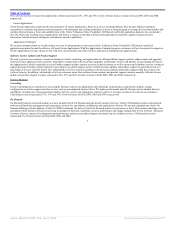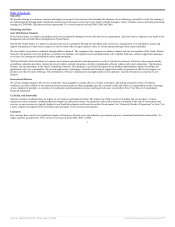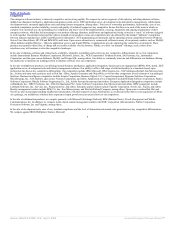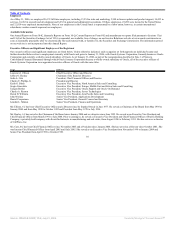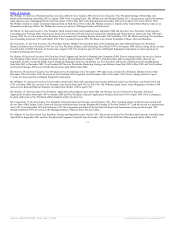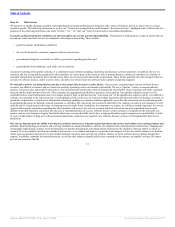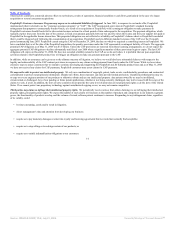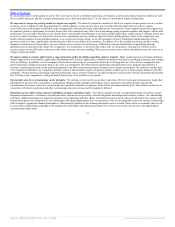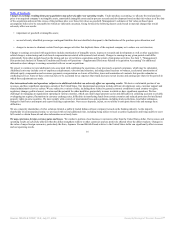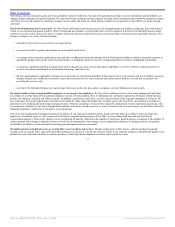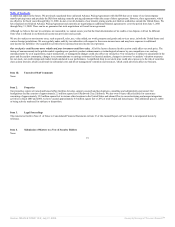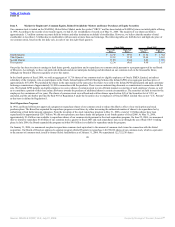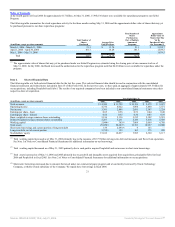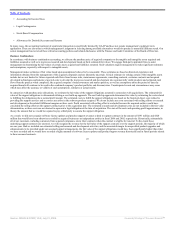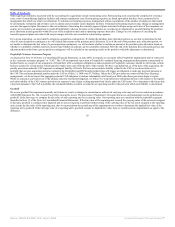Oracle 2005 Annual Report Download - page 19
Download and view the complete annual report
Please find page 19 of the 2005 Oracle annual report below. You can navigate through the pages in the report by either clicking on the pages listed below, or by using the keyword search tool below to find specific information within the annual report.
Table of Contents
Charges to earnings resulting from past acquisitions may adversely affect our operating results. Under purchase accounting, we allocate the total purchase
price to an acquired company’s net tangible assets, amortizable intangible assets and in-process research and development based on their fair values as of the date
of the acquisition and record the excess of the purchase price over those fair values as goodwill. Management’s estimates of fair value are based upon
assumptions believed to be reasonable but which are inherently uncertain. Going forward, the following factors could result in material charges that would
adversely affect our results:
• impairment of goodwill or intangible assets;
• accrual of newly identified pre-merger contingent liabilities that are identified subsequent to the finalization of the purchase price allocation; and
• charges to income to eliminate certain Oracle pre-merger activities that duplicate those of the acquired company or to reduce our cost structure.
Charges to earnings associated with acquisitions include amortization of intangible assets, in-process research and development as well as other acquisition
related charges, restructuring and stock-based compensation associated with assumed stock awards. Charges to earnings in any given period could differ
substantially from other periods based on the timing and size of our future acquisitions and the extent of integration activities. See Item 7, “Management’s
Discussion and Analysis of Financial Condition and Results of Operations—Supplemental Disclosure Related to Acquisition Accounting” for additional
information about charges to earnings associated with our recent acquisitions.
We expect to continue to incur additional costs associated with combining the operations of our previously acquired companies, which may be substantial.
Additional costs may include costs of employee redeployment, relocation and retention, including salary increases or bonuses, accelerated amortization of
deferred equity compensation and severance payments, reorganization or closure of facilities, taxes and termination of contracts that provide redundant or
conflicting services. Some of these costs may have to be accounted for as expenses that would decrease our net income and earnings per share for the periods in
which those adjustments are made.
Our international sales and operations subject us to additional risks that can adversely affect our operating results. We derive a substantial portion of our
revenues, and have significant operations, outside of the United States. Our international operations include software development, sales, customer support and
shared administrative service centers. We are subject to a variety of risks, including those related to general economic conditions in each country or region,
regulatory changes, political unrest, terrorism and the potential for other hostilities, particularly in areas in which we have significant operations. We face
challenges in managing an organization operating in various countries, which can entail longer payment cycles and difficulties in collecting accounts receivable,
overlapping tax regimes, fluctuations in currency exchange rates, difficulties in transferring funds from certain countries and reduced protection for intellectual
property rights in some countries. We must comply with a variety of international laws and regulations, including trade restrictions, local labor ordinances,
changes in tariff rates and import and export licensing requirements. Our success depends, in part, on our ability to anticipate these risks and manage these
difficulties.
We are a majority shareholder of i-flex solutions limited, a publicly traded Indian software company focused on the banking industry. As the majority
shareholder of an international entity, we are faced with several additional risks, including being subject to local securities regulations and being unable to exert
full control or obtain financial and other information on a timely basis.
We may experience foreign currency gains and losses. We conduct a portion of our business in currencies other than the United States dollar. Our revenues and
operating results are adversely affected when the dollar strengthens relative to other currencies and are positively affected when the dollar weakens. Changes in
the value of major foreign currencies, particularly the Euro, Japanese Yen and British Pound relative to the United States dollar can significantly affect revenues
and our operating results.
16
Source: ORACLE CORP, 10-K, July 21, 2006 Powered by Morningstar® Document Research℠


